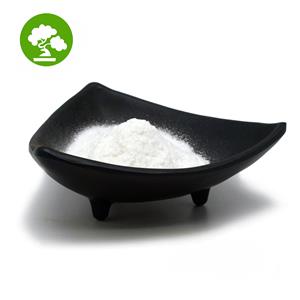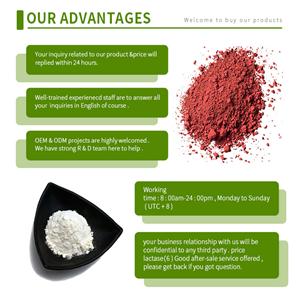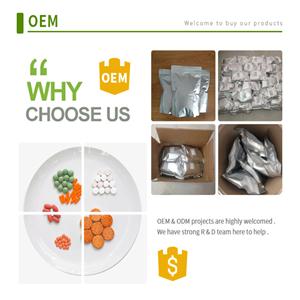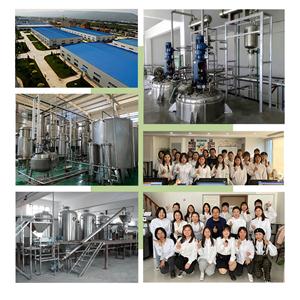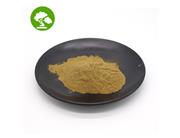1/5
Anhydrous citric acid NEW
- Min. Order1kg
- Purity99%
- Cas No77-92-9
- Supply Ability2000ton
- Update time2024-04-12

| Product Name | Anhydrous citric acid |
| CAS No | 77-92-9 |
| EC-No | 201-069-1 |
| Min. Order | 1kg |
| Purity | 99% |
| Supply Ability | 2000ton |
| Release date | 2024/04/12 |
Anhydrous citric acid is a natural component and an intermediate product of physiological metabolism in plants and animals, and is also one of the most widely used organic acids in food, medicine, chemical industry and other fields. It is colorless transparent or translucent crystal, or granular, granular powder, odorless, although a strong sour taste, but pleasant, slightly astringent. Gradually weathering in warm air, slightly deliquescent in moist air.
Application:
It is mainly used as a sour flavor agent for food, and is also used in the preparation of pharmaceutical coolant and detergent additives;
Used as experimental reagent, chromatographic reagent and biochemical reagent, and also used in the preparation of buffer solution. Used in the food industry especially as an acidifier, PH buffer, and as a preservative with other compounds. In the detergent industry, it is an ideal substitute for phosphate. Boiler chemical cleaning acid cleaning agent, boiler chemical cleaning bleaching agent. It is mainly used as a sour flavor agent for food, and is also used in the preparation of pharmaceutical cooling agent and detergent;
Anhydrous citric is the most versatile and widely used acid agent. It has high solubility, strong chelating ability to metal ions, and can be used for all kinds of food, according to the production needs of appropriate use. In addition, this product can also be used as an antioxidant synergist, a synergist and a preservative in the combination of potato starch bleach;
Widely used as food, beverage sour agent and drug additive. It can also be used as raw materials and additives for cosmetics, metal cleaning agents, mordants, non-toxic plasticizers and boiler anti-scaling agents. Its main salt products are sodium citrate, calcium and ammonium salt, sodium citrate is a blood anticoagulant, ammonium ferric citrate can be used as blood tonic drugs;
Used as an analytical reagent.
Applications in the food industry
Anhydrous citric acid is known as the first edible acid taste agent, and China GB2760-1996 stipulates that it is allowed to use food acidity regulator. In the food industry, it is widely used as sour agent, solubilizer, buffer, antioxidant, deodorant, chelating agent, etc., its specific uses are too numerous to list. 1. Beverage According to domestic and foreign statistics, the citric acid consumed by the beverage industry accounts for 75% to 80% of the total citric acid production. Citric acid is one of the natural ingredients of fruit juice, which can not only give fruit flavor but also solubility, buffering, antioxidant and other effects, so that sugar, flavor, pigment and other ingredients in the beverage blend and coordinate, form a harmonious taste and aroma, and increase the anti-microbial anti-corrosion effect. Therefore, it is widely used to prepare a variety of fruit type soft drinks, such as fruit type soft drinks generally add acid between 0.10% and 0.25%. For drinks that are not filled with CO2, such as water, juice, sugar, acid, color, flavor mixtures, citric acid is used to adjust the pH to a certain acidity, so that the titration acidity of the product is between 0.25% and 0.40%. For pulp solid beverage powder, the amount of citric acid added can be increased to 1.5% ~ 5.0%. In recent years, with the continuous improvement of urban and rural people's living standards, the demand for various beverages has increased significantly, and it can be predicted that the amount of citric acid in the beverage industry will increase significantly in the future. 2. Jam and jelly The role of citric acid in jam and jelly is similar to that in drinks, mainly regulating the pH of the product and giving the product sour taste, and the pH must be adjusted to a very narrow range that is most suitable for pectin coagulation. Depending on the type of pectin used, the pH can be limited between 3.0 and 3.4. In jam production, it can improve the flavor and prevent the defect of sucrose crystallization out sand. 3. Candy citric acid added to candy can increase the sour taste and prevent the oxidation of various components and sucrose crystallization. General sour candy can contain 2% citric acid. After boiling the sugar, the citric acid is added together with the pigment and essence during the cooling process of the sugar paste. Citric acid in the production of pectin jelly can regulate the acid taste and enhance the gel strength. Anhydrous citric acid is used in chewing gum and powdered foods. 4. Frozen food citric acid has the characteristics of chelating and regulating pH, which can strengthen the effect of antioxidants and inactivate enzymes, and can ensure the stability of frozen food more reliably. Citric acid, alone or in combination with isascorbic acid, helps extend the shelf life of frozen fish and shellfish by inactivating and chelating trace elements in enzyme systems that can cause fish spoilage and shellfish spoilage. Seafood is generally soaked in 0.25% citric acid and 0.2% isoascorbic acid solution before freezing, which is conducive to preservation and refrigeration. It is also effective for fresh pork preservation and preventing corruption. Citric acid can also inhibit the color and aroma of frozen fruits, which is also to inhibit the enzyme system in the fruit and prevent the oxidation of trace elements, for example: 0.1% ~ 0.3% citric acid and 0.001% ~ 0.002% isoascorbic acid is effective.
Applications in the pharmaceutical industry
Effervescent is a popular oral drug ingredient release system in which citric acid reacts with sodium carbonate or sodium bicarbonate aqueous solution to produce a large amount of CO2(i.e. effervescent) and sodium citrate, which can quickly dissolve the active ingredient in the drug and enhance the taste ability. For example, to make laxatives and painkillers solubilizing. Citric acid syrup is a refreshing drink for patients with fever, which has the effect of correcting taste, cooling and detoxification. Citric acid is widely used in various nutritional oral liquids, buffering pH3.5 ~ 4.5, maintaining the stability of active ingredients, and strengthening the effect of preservatives. The combination of citric acid and fruit essence gives people the favorite aromatic acid taste to cover up the bitter taste of the drug, especially in the traditional Chinese medicine preparation, adding 0.02% citric acid to the liquid ingredient can form a complex of trace iron and copper, delaying the degradation of the active ingredient. The use of 0.1% ~ 0.2% citric acid in chewing tablets can improve the flavor of tablets and make them have lemon flavor.
Applications in industry
1. Metal purification The citric acid based metal purification formula can effectively remove oxides formed on the surface of ferrous and non-ferrous metals. As a weak organic acid, it can cause slight damage to the metal surface layer, while as a metal ion chelating agent it accelerates the migration of metal oxides. In order to eliminate metal oxide stress cracks and minimize the corrosion brittleness of high-strength steel, citric acid is used to remove rust instead of inorganic strong acids. In boilers, heaters, superheater tubes, dirty reactors, and stainless steel equipment, citric acid prewashing and purification are generally used to remove iron and copper oxides, especially where chlorides are not allowed. The purification reaction of citric acid solution should be carried out when it is higher than 37.8℃, and the purification time should be extended correspondingly when it is lower than 37.8℃. The amount of citric acid and the action conditions should be adjusted by increasing or decreasing the estimated precipitation amount. Citric acid is a highly efficient chelating cleaning agent, which is effective for dirt such as calcium, magnesium, iron, chromium and copper, and is widely used for cleaning various metal surfaces. After washing, the wastewater is biodegradable and does not pollute the environment. In recent years, citric acid is suitable for the chemical treatment of metal purification, but also for the non-polluting ashing of waste solvents, citric acid molecules in the ash into CO2 and water vapor and valuable metals can be recovered from the ash, for toxic or radioactive elements can be fully closed for chemical treatment. 2. Detergent sodium citrate can increase decontaminating performance, in many household detergent products can accelerate biodegradation, can be used as a phosphate substitute, a large number of used in laundry detergent, detergent, sodium citrate and aluminum silicate together to enhance the cleaning agent cleaning effect is very effective. Industrial grade 50% citric acid solution is used as raw material in these products. In non-synthetic detergent solutions, citric acid is also used in hot water extraction as a carpet cleaner, bath and textile softener due to its buffering effect and the ability to chelate trace metals. 3. Soilless cultivation agriculture in foreign countries using trace element plant nutrient solution soilless cultivation has long been common, and has begun to develop in China. In order to remove some excessive elements such as copper, zinc, manganese and chromium from the soil, citric acid is generally used to chelate such elements. The use of citric acid instead of phosphate can achieve a satisfactory yield increase. 4. The application of citric acid in minerals and pigments has a dispersing effect, which can reduce the viscosity of some important slurry raw materials. In mining, for example, the viscosity of phosphate rock powder in hydraulic transportation often becomes the main reason of clay expansion. The expansion can be controlled by citric acid treatment, which makes the slurry raw material easy to transport. Citric acid also reduces the precipitation of the concentrated raw material of titanium dioxide, making it easy to handle and transport in whole form. Citric acid can also be used as a dispersant for low-pulp adhesives, paint and textile raw materials, and titanium dioxide.
Storage Condition | Keep in a cool and dry place |
Transportation | By Sea or by Air(DHL/UPS/TNT/FEDEX/EMS) |
Delivery Time | 7-28 days |
Payment | T/T, Western Union or Bitcoin |

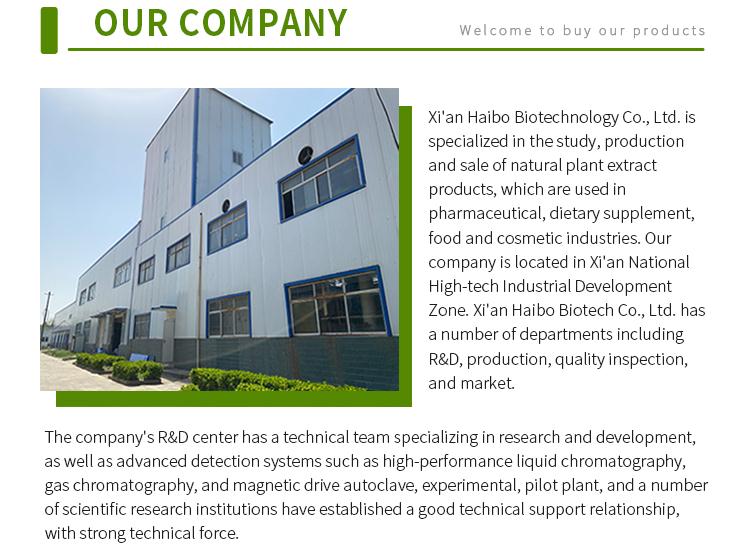


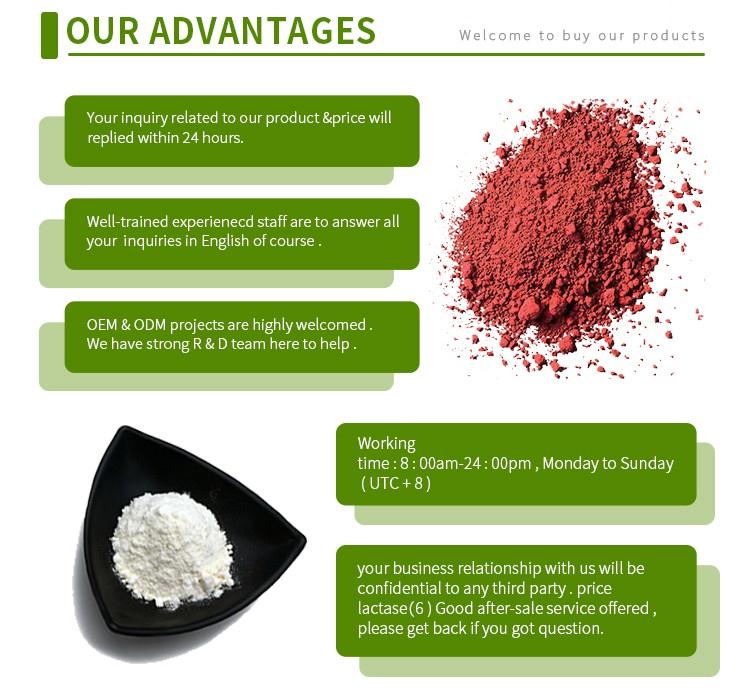

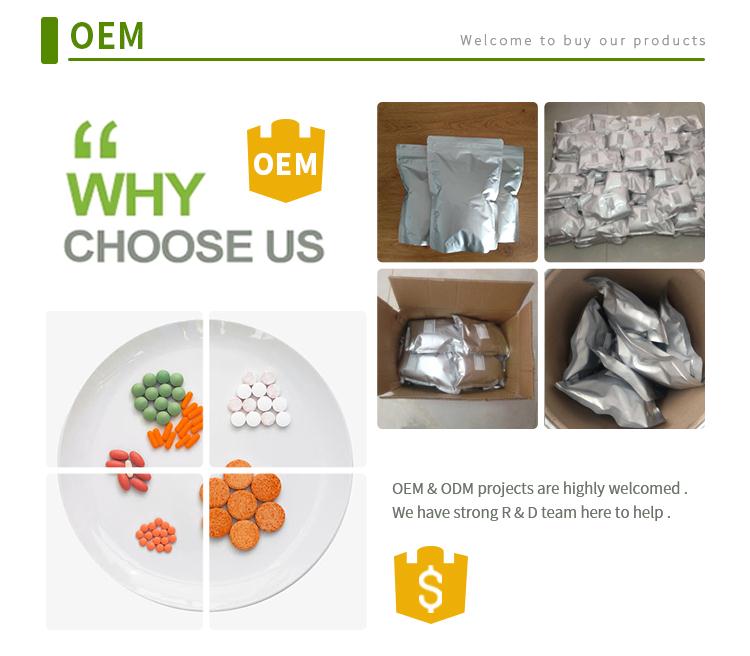



Company Profile Introduction
Xi'an Haibo Biotechnology Co.,Ltd. is specialized in the study, production and sale of natural plant extract products,which are used in pharmaceuticaldietary supplement, food and cosmetic industries. Our company is located in Xian National High-tech Industrial Development Zone. Xian Haibo Biotech Co.,Ltd. has a number of departments including R&D, production, quality inspection, and market. The company's R&D center has a technical team specializing in research and developmentas well as advanced detection systems such as high-performance liquid chromatography, gas chromatography,and magnetic drive autoclave, experimental, pilot plant,and a number of scientific research institutions have established a good technical support relationship,with strong technical force. The company's production workshop has several plant extraction production lines, as well as advanced production equipment such as dynamic countercurrent extraction,column separatio
